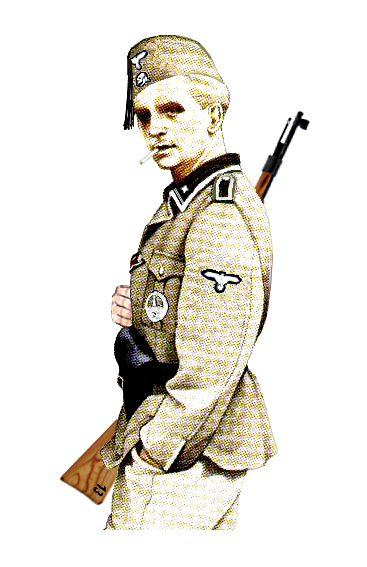
“He who does not have his own flag is obliged to fight for another’s” – Unknown
The following will be a more intimate look at the 13th SS Division (and in many cases its sister divisions) through the many anecdotes, myths, facts, statistics and general trivia known to us so far. The preceeding “manuscript” left out much including a good time-line of events post November 1944. This attempt will however still be written in brevity to avoid redundancy.
1943 – Recruitment, Training in France and Germany
“Ko nema šta jest,
Neka ide u eses
Pa će dobiti zeleni fes
i svašta će jest!”
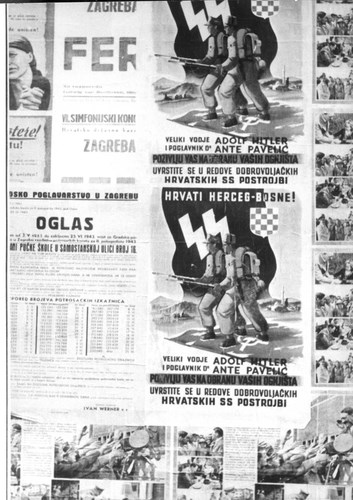
The idea of a division consisting of Bosnians had been first raised when the 7th SS was being organized. One source later boasted that a 100,000 volunteers could have been found in 1941, as opposed to only 20,000 in 1943. Which was not far off its mark since Bosniaks enlisted in all three of the legionary Wehrmacht divisions raised in Croatia and were amongst the ill-fated 369th Infanterie Regiment (~1,500) that perished at Stalingrad (these units were raised prior to Handschar, Kama, Batschka or Skanderbeg).
The Waffen SS first made its impression on the Bosnians with the arrival of the division Prinz Eugen to eastern Bosnia, a region where the communists and Chetniks routinely victimized the Bosniaks and the Croats. Their primary means of self defense in those parts was the infamous Black Legion. To make matters worse, Arthur Phleps did not have the cooperation of the Italians in the area and would often be forced to threaten them with Stukas in order to get compliance. As to the chetniks, he considered them neither friends nor enemies but a threat that should be disarmed at any opportunity.
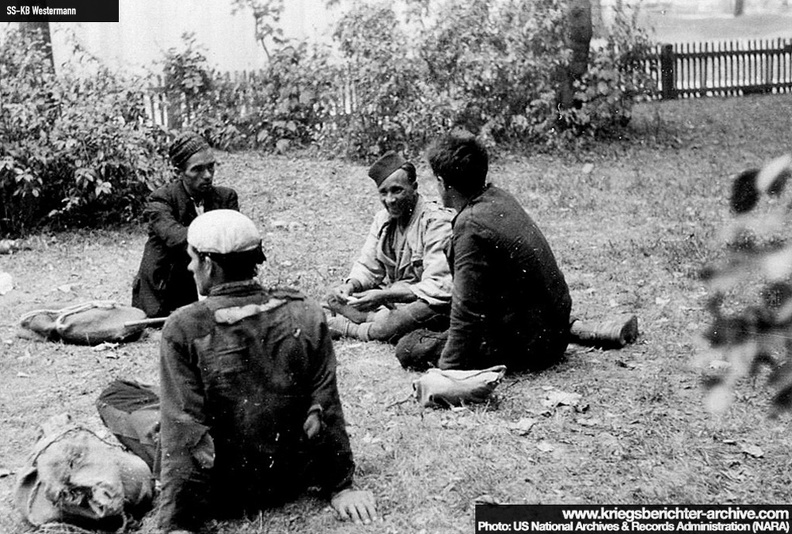 “When we found out that the Bosnians would be allowed into German service many took the opportunity. In Bosnia existed a nostalgic reverence towards the former Austro-Hungarian monarchy. With that we felt a connection to the German Reich. To us Germany stood for cleanliness, order and discipline. Of the Jews and the concentration camps we knew nothing.” – Imam Ibrahimovic
“When we found out that the Bosnians would be allowed into German service many took the opportunity. In Bosnia existed a nostalgic reverence towards the former Austro-Hungarian monarchy. With that we felt a connection to the German Reich. To us Germany stood for cleanliness, order and discipline. Of the Jews and the concentration camps we knew nothing.” – Imam Ibrahimovic
“The greater majority of us did not know what the SS was, or that it was elite. I originally thought that the two letters stood as acronyms of a particular unit, but they later told us that this was the German army for foreigners. Prior to this I was in the Domobrans. In one particular case we were saved from sure defeat by the arrival of the Germans. I had no desire to go back to the Domobrans after that. So I went into the SS. Like others then I never heard anything about the concentration camps in Germany where they were killing masses of people. We knew of the camps at Jasenovac and Gradiska because the Ustasa were openly talking about them and also threatening anyone with them.”
Optimism was voiced at the highest levels:
“I’m sticking by my decision to raise a Muslim SS division,the Bosniaken as a people are currently neither fighting with us or against us, but I am certain that the Bosniaken would make loyal soldiers if brought to our side. – H.Himmler
Arrival in France
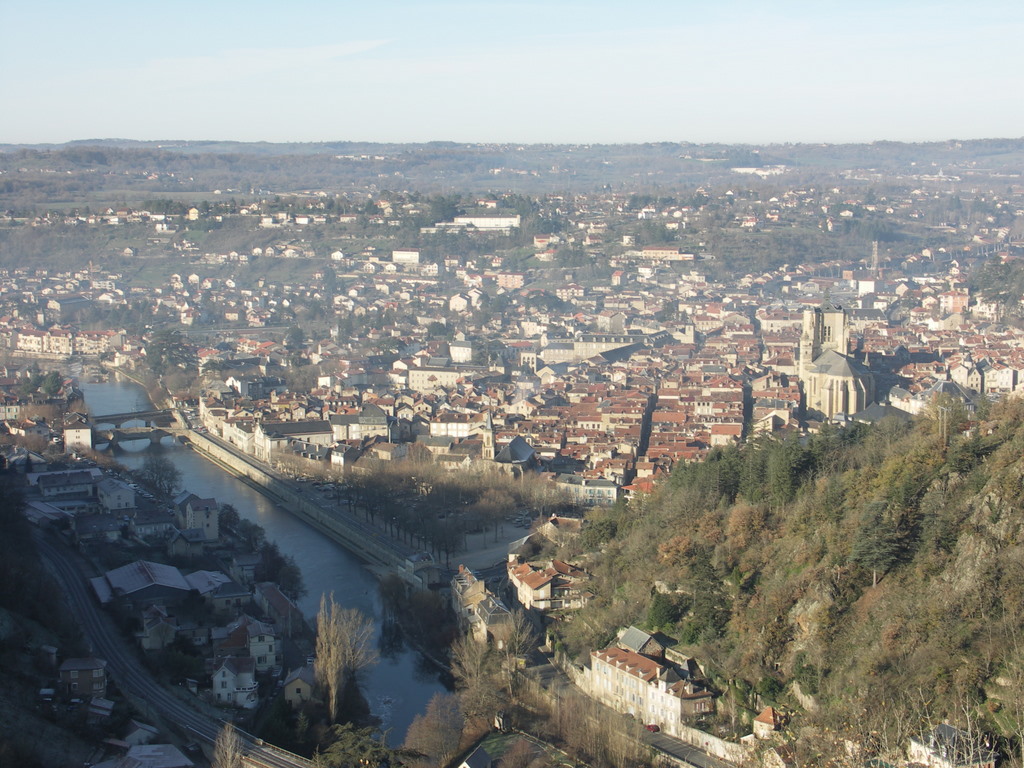 Villefranche-de-Rouergue today. Many of the volunteers were smitten by its similarity to Sarajevo. None better described this first impression than Fadil Ekmecic
Villefranche-de-Rouergue today. Many of the volunteers were smitten by its similarity to Sarajevo. None better described this first impression than Fadil Ekmecic
“Regardless of the approach, one had the impression that he was entering Bosnia. On the road were plum trees, walnuts and the scattered flocks of sheep. There were roads that snaked around, rose and descended as they went, no wider than those we had in Bosnia. No city in southern Rouergueu wasnt as attractive like Villefrance was on its approach. We Bosnians descended down upon the city from the direction of Rodez and had the feeling that we were coming up on the Bascarsija (famous square in Sarajevo). Villefranche is an old city with streets no wider than one’s arm span, and somewhere even narrower. There were three schools into which the pioneers were situated.”
Training/Initial impressions
The initial impression made on the transferred SS trainers was not a positive one. The candidates for the first officer/NCO course held in the Spring of 1943, most of whom only had paramilitary training and experience of the Ustasas or the Domobrans, were found lacking in organizational skills. Their performance with heavy weapons such as mortars was also dubious. A Reichsdeutsche officer pointed out that the language barrier seemed to be more pronounced in this division than in any others (up to that point). The Volksdeutsche (Germans born outside of the Reich) were found useful in this regard since many spoke the language of the Bosnians. Even Himmler later observed the bi-lingual nature of the division (The Division’s newspaper was also written in both languages). As later events would prove, these issues were only initial assessments and did not predict the division’s performance.
*eventhough this was Vichy France, these soldiers-in-training were still put on guard duty and often armed with only 15 rounds of rifle ammunition.
Mutiny of 17.IX.43
Speaking much later on the topic of supposed English interference in the mutiny, one of the division’s translators said:
“Dzanic lied and fooled his Bosniaks with the fairy tale of English help! How could he in a span of less than 6 weeks come into contact with the English and form a plan for a division wide mutiny? A division which was spread across 60km in various places..”
– Z. Bernwald
(Bernwald was of the opinion that the mutineers had not fully comprehended the futility of their actions. Even if Villefranche was liberated he said, Hitler would’ve simply sent 10 Stukas to level the place.)
A third party observer watching the action in the streets was a French WW1 veteran, who either jokingly or in a confused manner noted that:
“these Germans are shooting at each other now.”
Bajram 1943 (Speech-making and gift-giving)
“Much happened on the first day of Ramazan Bajram. Division commander held a talk in front of all of the troops and wished them a happy Bajram and then said: On behalf of Heinrich Himmler and myself, I extend my personal commendations to imam Halim Malkoc and all imams of the division Handschar. Upon Malkoc I bestow the rank of Hauptsturmfuhrer and the Iron Cross 1st class. The other imams likewise will receive promotions in rank as a true mark of their soldierly capabilities. In the future, the imams will be referred to as “sonderfuhrers.”
“You Bosnian Muslims have experienced the Serbian terror, the British agents have not only allowed such evil acts to occur but encouraged the merciless policy, not only that but both Russia and England have promised their support.” – Husseini
Acting division imam Husein Djozo thanked Himmler for his donations to the family members of the Bosniaken, increasing the troop bread ration, and the establishment of imam school. ” (These deeds) signify the great benevolence for us Muslims and for Bosnia in general. I therefore consider it my duty to extend our thanks to the Reichfuhrer SS in the name of division’ imams as well as in name of hundreds of thousands of Bosnian’s poor in that I pledge that we are prepared to lay down our lives to battle for the great leader Adolf Hitler and the New Europe.”
Inspection by the Mufti – Neuhammer 1943
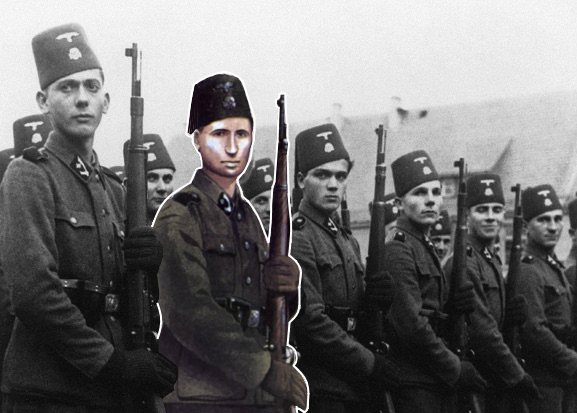
Franz Rauner, a transferee (from 7th SS) was instructed to form the much photographed honor guard in anticipation of the Mufti’s visit.
“We will be visited by the Grossmufti and the Reichsfuhrer of the SS. In preparation for their arrival I want you to put together an honor guard detail. You have two months times to train them up.” Sauberzweig to Rauner (form. 7th SS)
“I requested half of (every?) working day for the training of the platoon and was approved. We began drilling immediately. I told the soldiers who would be coming for a visit, how we were to be filmed for the news and that they should make the effort to show what Bosnians are capable of. They were therefore highly motivated and drilled smartly.”
Franz later said:
“Bosnians were exceptionally good soldiers. In the thick of the fighting they asked for neither bread nor ammunition(ie. they wanted for nothing). They had trained well.”
In their early estimations of what the division was to become, some had predicted that the Bosniaks were not Prussians and “that those trying to make them into Prussians were in for trouble.” Those initial impressions were proving to be wrong. (Neuhammer sits in Silesia, the location of Frederick the Great’s first conquest of 1740, the symbolism was more than subtle in this case).
*many original Waffen SS members had low opinions of the Volunteer SS in general. The 7th SS was once described as a “pig sty”, but the descriptions of the performance of the original SS-VT (by the Wehrmacht) were equally disapproving. (Handschar was a unique case however, the Reichsdeutsche made little to no effort to learn the language and often resented the Volksdeutsche for speaking their native language with the Bosnians).
Back in Bosnia:
The relief effort was extensive, with even the division members pitching in 88,000 Rms. Reichfuhrer himself contributes 250,000 Rms. Husseini also makes a contribution to the Merhamet foundation. On Feb 14th 1944, Gottlob Berger suggests each family member of an SS member recieves:6 kilos of flower, 150g butter, 200g sugar, 200g salt, 200g “tjestenima” and 500g beans/vegetables. By comparison the average German citizen in 1945 could rely on a ration of only 125g butter, 250g meat and 1700g bread. However with 208,000 refugees coming out of eastern Bosnia, and the fact that around 80,000 had a family member serving in the SS, the initiative was a sound investment and likely improved morale and trust between the Bosnians and the Germans.
The local politics were beginning to focus more on the Bosniaks as an element critical to a victory in the region. In September of 1943, the partisans raised the 16th Muslim Bde. (peak strength 450, fought against the 14th SS Regt – summer 44). This unit would later occupy vacated cities and villages left by the 13th Div. and would even receive some of its deserters, thus completing the cycle.
That November the Bosniaks began campaigning for their autonomy from Croat rule. Prof. Nesad Topcic, Muhamed Pandza of Sarajevo were among the loudest voices.
The Division’s Newspaper – Handschar
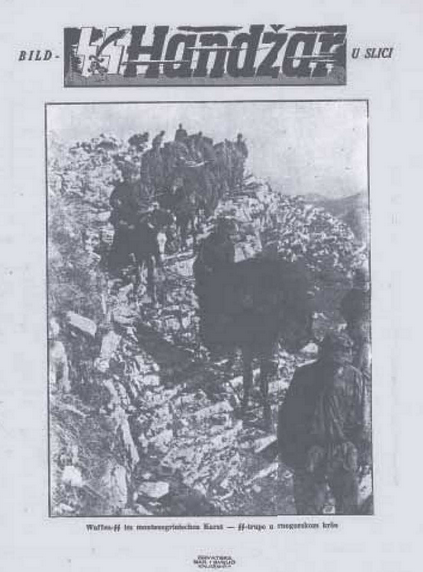
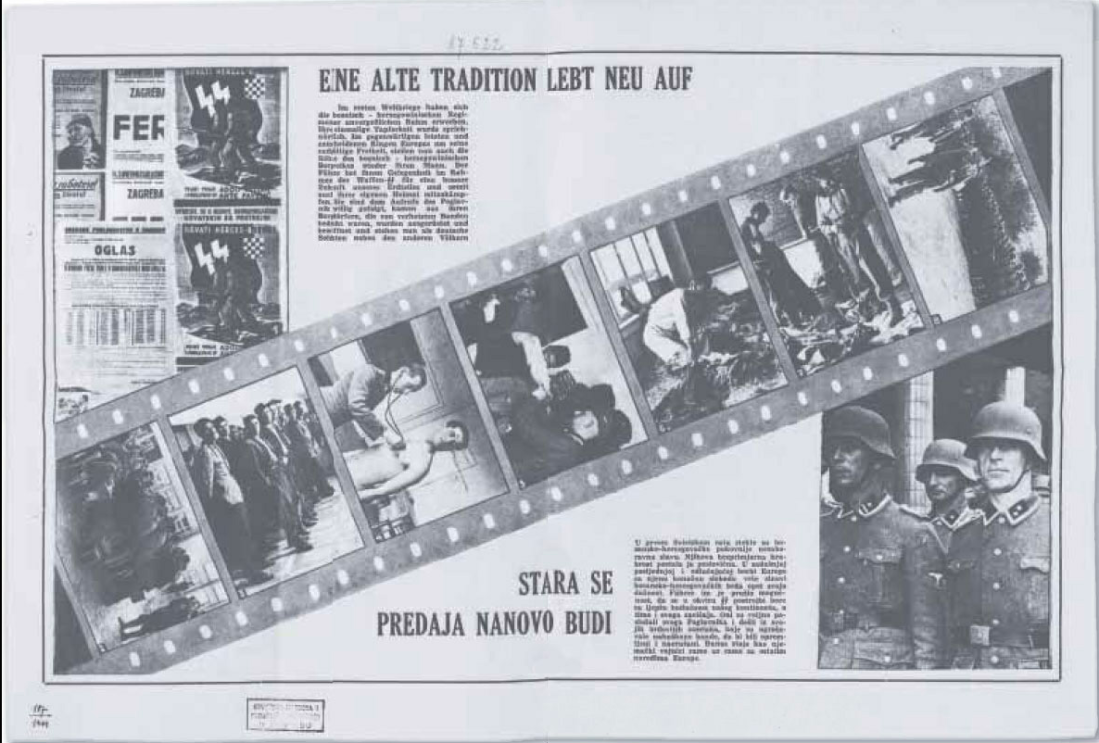
Early on during the training in France, editions of the division newspaper were being published. This was the aptly named “Handzar.” The overwhelming Bosniak majority was represented in all but the name/designation of the division itself. Fadil Sirce often argued with the Croats about the true identity of the division especially on the day the unit designation changed from “13-SS-Frw-b.h.Div” to “1st Croatian.”The Croat schachbrett would come later still.
The division magazine “Handzar” made frequent entries mentioning the WW1 Bosnian regiments as well as amusing anecdotes regarding the old Prussian king. The magazine was a bicultural publication with German entries being translated into Bosnian and vice versa. They were reminded of their Prussian past, the Bosniak lancers and the great benevolence of the Prussian monarch and his tolerance of all religions:
“All religions must be tolerated and the crown must ensure that none is detrimental to the other, for each must be allowed to worship in their own way.” Furthermore, he said: “All religions are equal and good when the people who profess them are honest people; and should Turks and heathens come to populate the land, then we shall endeavor to build mosques and churches for them.”
– Iron Kingdom – Christopher Clarke pp. 252-3
One amusing story that was featured tells of the interaction between Frederick II and one of his palace guards. Confused as to why a servant had not come to his quarters when called for, Fritz ventured out of his room to talk to a grenadier posted on the doorway. He then asked the grenadier to go and fetch his servant, only to be rebuffed once again. The grenadier politely told him that he could not quit his post without proper relief and asked them king to act as his replacement. Fritz then took up his musket and manned the post until the grenadier returned with his servant. The king found this so amusing that he complimented the soldier upon his return for his devotion and understanding of his duty.